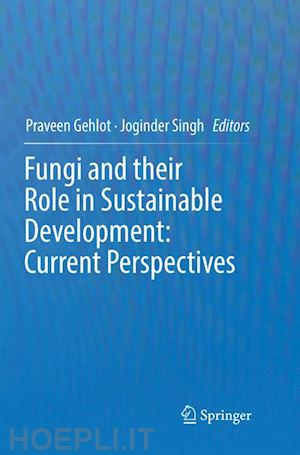
Questo prodotto usufruisce delle SPEDIZIONI GRATIS
selezionando l'opzione Corriere Veloce in fase di ordine.
Pagabile anche con Carta della cultura giovani e del merito, 18App Bonus Cultura e Carta del Docente
Part 1. Sustainable Cultivation and Conservation Strategies of Fungi.- Chapter 1. Cultivation, conservation and medicinal significance of macro-fungi.- Chapter 2. Fungi as biocontrol agent: an alternate to chemicals.- Chapter 3. Incredible Role of Fungi in various Fields for sustainable development.- Chapter 4. The biological promises of endophytic Muscodor species.- Chapter 5. Slime Moulds: The Tiny Charmers.- Chapter 6. Fungal Biotechnology: Role and Aspects.- Part 2. Sustainable Aspects of Fungi in Agriculture.- Chapter 7. Fungal Endophytes: Role in Sustainable Agriculture.- Chapter 8. Fungal endophytes and their secondary metabolites - Role in sustainable agriculture.- Chapter 9. Agricultural important microorganism- Sustainability from rhizosphere to bioformulation as weapon for biological control.- Chapter 10. Recruit the Plant Pathogen for Weed Management: Bioherbicide - A Sustainable Strategy.- Chapter 11. Mycopesticides: Fungal based pesticides for sustainable agriculture.- Chapter 12. Multifactorial role of Arbuscular Mycorrhizae in Agroecosystem.- Chapter 13. Strategic approaches for applications of entomopathogenic fungi to counter insecticide resistance in agriculturally important insect pests.- Chapter 14. Arbuscular Mycorrhizal Fungi as phosphate fertilizer for crop plants and their role in bioremediation of heavy metals.- Chapter 15. Fungal community in mitigating impacts of drought in plants.- Chapter 16. Role of Fungi as Biocontrol Agents for the Control of Plant Diseases in Sustainable Agriculture.- Chapter 17. Fungal disease management in chickpea: current status and future prospects.- Chapter 18. Recent approaches for late blight disease management of potato caused by Phytophthora infestans.- Part 3. Fungi for sustainable Industrial and Environmental Aspects.- Chapter 19. Recent advances and industrial applications of microbial xylanases: A review.- Chapter 20. Bio-Valorization of Dairy Whey for Bio-Ethanol by Stress Tolerance Yeast.- Chapter 21. Nutritional quality attributes of edible gasteroid wild mushroom Astraeus hygrometricus.- Chapter 22. Biotechnology of Fungal Lipases.- Chapter 23. Biopigments: Fungal Pigments.- Chapter 24. Bioethanol Production from Renewable Biomass by Yeast.- Chapter 25. Fungi Inhabiting in Hypersaline Conditions - An Insight.- Chapter 26. Carbon sequestration and the significance of soil fungi in the process.- Chapter 27. Fungal infections and Intervention in Diabetic complication.- Part 4. Bioconversion Technologies of Fungi.- Chapter 28. Arbuscular Mycorrhizal Fungi: Effects on secondary metabolite production in medicinal plants.- Chapter 29. Endophytic fungi: Carrier of potential antioxidants.- Chapter 30. Current perspectives of Endophytic fungi in Sustainable Development.- Chapter 31. Marine Fungi for Sustainable Development.- Chapter 32. Fungi-mediated biodeterioration of household materials, libraries, cultural heritage and its sustainable conservation.- Chapter 33. Co-cultivation strategies to induce de-novo synthesis of novel chemical scaffolds from cryptic secondary metabolite gene clusters.- Part 5. Modern Biotechnological Interventions on Fungi.- Chapter 34. Computational approaches to understand the genome and protein sequences of fungi.- Chapter 35. Bioprospecting ofendophytic fungi for bioactive compounds.- Chapter 36. Bioactive Compounds from Endophytic Fungi.- Chapter 37. Bioactive potential of non-conventional edible wild mushroom Amanita.- Chapter 38. Fungus Monascus -fermented red yeast rice (RYR): Natural therapeutic statin source or mycotoxin?.- Chapter 39. Nanoparticles from Fungi (Myconanoparticles).
Dr. Joginder Singh Panwar is presently working as an Associate Professor at the Department of Biotechnology, Lovely Professional University, Punjab, India. Previously, he has worked as Young Scientist at Microbial Biotechnology and Biofertilizer Laboratory, Department of Botany, Jai Narain Vyas University in Department of Science and Technology, Govt. of India. His research interest is to explore different efficient strategies towards bioremediation and phytoremediation of pollutants from water and soil. Presently, he is working on designing and development of cleanup technology (biofilters) for in-situ bioremediation of textile industrial effluents. He is an active member of various scientific societies and organizations including, Association of Microbiologists of India, Indian Society of Salinity Research Scientists, Indian Society for Radiation Biology, and European Federation of Biotechnology. Till now, he has published more than 60 research and review articles in the peer-reviewed journals and authored or co-authored numerous books and book chapters.











Il sito utilizza cookie ed altri strumenti di tracciamento che raccolgono informazioni dal dispositivo dell’utente. Oltre ai cookie tecnici ed analitici aggregati, strettamente necessari per il funzionamento di questo sito web, previo consenso dell’utente possono essere installati cookie di profilazione e marketing e cookie dei social media. Cliccando su “Accetto tutti i cookie” saranno attivate tutte le categorie di cookie. Per accettare solo deterninate categorie di cookie, cliccare invece su “Impostazioni cookie”. Chiudendo il banner o continuando a navigare saranno installati solo cookie tecnici. Per maggiori dettagli, consultare la Cookie Policy.